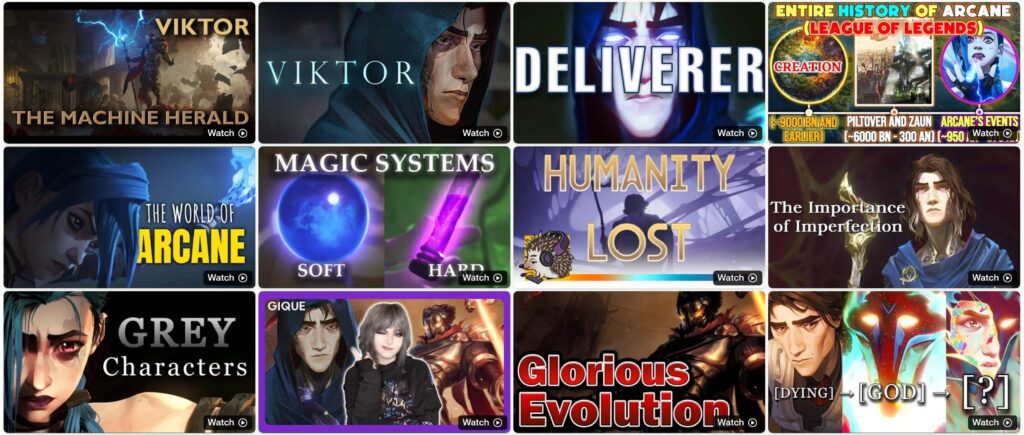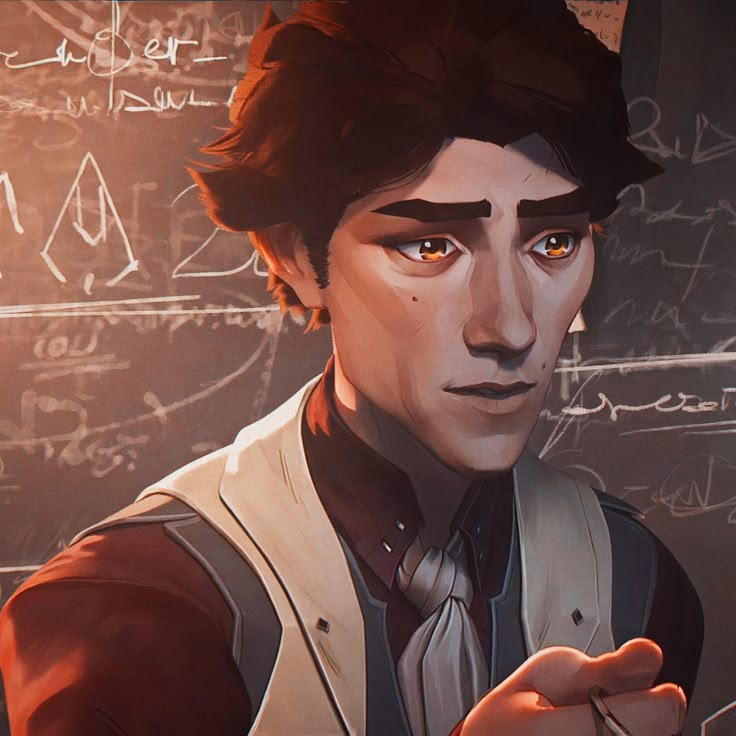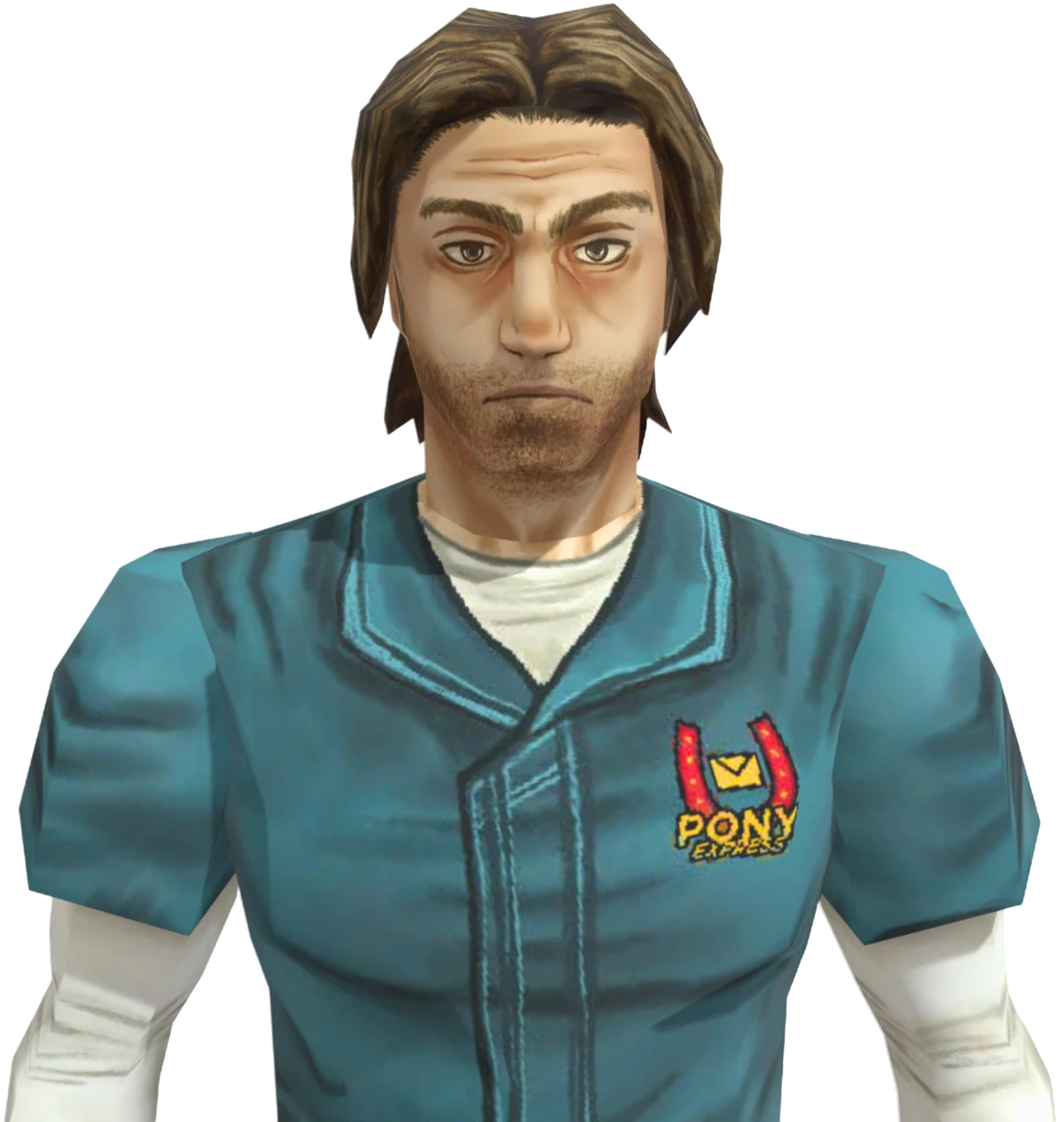
Viktor stands out among Arcane’s characters as a symbol of progress’s true cost. This brilliant scientist born in Zaun’s toxic undercity embarks on one of the show’s most compelling character arcs, transforming from a disabled young inventor into a cybernetically enhanced being known as the Machine Herald. His story challenges our understanding of human development, scientific ethics, and the boundaries between progress and preservation.
Viktor’s journey explores the profound question of what it means to be human in an age of unprecedented technological advancement. His personal struggle with mortality and his quest to overcome biological limitations through his “Glorious Evolution” philosophy creates a character of remarkable depth and complexity. This report delves into Viktor’s character, examining his origins, transformation, relationships, philosophy, and ultimate fate.
Origins and Early Life
Viktor’s story begins in the undercity of Zaun, where he was born with a physical disability that manifested as a malformed leg requiring the use of a cane. This disability significantly impacted his childhood, isolating him from other children and their activities. Unable to join in their games due to his condition, Viktor turned inward, developing his brilliant mind through solitary invention and problem-solving.
Even with his physical challenges, Viktor’s exceptional intellect found purpose through engineering. His early years were marked by several achievements that showcased his potential: he built a working model steamboat, developed sophisticated problem-solving skills through independent projects, and learned to navigate Zaun’s challenging infrastructure despite his disability. These early experiences built an inner resilience against society’s barriers that would define his character throughout his life.
Viktor’s trajectory changed dramatically after a chance encounter with Singed, a controversial scientist conducting experiments in Zaun. When Viktor’s toy boat drifted into Singed’s laboratory, he discovered Rio, a mutated creature under experimentation. This meeting sparked his passion for science, though the darker aspects of unchecked progress would later trouble him. The relationship between young Viktor and Singed was complex – Singed recognized Viktor’s potential and attempted to mentor him, possibly seeing him as a successor or surrogate son.
The defining moment in Viktor’s early life came when Professor Heimerdinger recognized his exceptional intellect and offered him admission to Piltover’s prestigious academy. This opportunity bridged two worlds, connecting Zaun’s undercity with Piltover’s privilege, and laid the groundwork for Viktor’s unique perspective that would later inform his scientific work and philosophy.
Academic Partnership with Jayce
Viktor’s time at Piltover’s Academy marked a significant evolution in his character. His systematic and logical approach to science distinguished him from his peers. The disability that once isolated him now drove him to create solutions benefiting others. During this formative period, he met Jayce, beginning a partnership that would change both their futures and reshape both cities.
The relationship between Viktor and Jayce represents one of Arcane’s most nuanced and well-developed dynamics. Their bond was built on mutual intellectual respect and a shared passion for innovation, with Jayce even referring to Viktor as his “brother.” Where Jayce brought ambition and charisma, Viktor contributed methodical thinking and ethical consideration. This complementary dynamic made their scientific partnership exceptionally productive.
Together, they pioneered Hextech technology, harnessing magical power contained within rare crystals to create tools accessible to non-magical users. This revolutionary discovery promised to transform society, particularly through inventions like the Hexgates, which turned Piltover into a global shipping hub and brought unprecedented prosperity to the city. Their collaborative work on devices like the Atlas Gauntlets also demonstrated their shared vision of using technology to improve workers’ lives.
However, fundamental differences in their approaches to science eventually emerged. Viktor maintained a steadfast focus on using technology to benefit ordinary people, especially the underprivileged in Zaun. He consistently advocated for implementing Hextech to improve lives rather than as a tool for profit or military applications. In contrast, Jayce became increasingly entangled in Piltover’s politics and commercial interests, creating tension in their partnership.
Their scientific collaboration led to the development of the Hexcore, an “adaptive rune matrix” or “hextech that evolves” when exposed to organic matter. This creation would eventually become central to Viktor’s transformation, both physically and philosophically, further altering the dynamic between the two scientists.
Terminal Illness and Transformation
Viktor’s physical transformation begins with a profound personal crisis. Born with a disability and later suffering from a terminal illness caused by Zaun’s toxic environment, Viktor faces mortality directly and desperately. This existential threat becomes the catalyst that drives him toward increasingly radical solutions.
As his condition deteriorates, Viktor begins secret experiments with the Hexcore, believing it could potentially adapt to and heal his failing body. A pivotal moment occurs when Viktor, in desperation, obtains Shimmer from Singed and injects it into his system. The combination of Shimmer and the Hexcore allows him to temporarily transmute his crippled leg into a functional robotic limb. For the first time in his life, Viktor experiences the freedom of running without his cane – a transformative moment that convinces him of the potential in merging human and machine.
The transformation process accelerates but spirals out of control when Viktor runs out of Shimmer. During one experiment, the Hexcore becomes unstable and nearly consumes him. At this critical moment, his assistant Sky Young attempts to save him by pulling him away from the Hexcore. The result is tragic – the Hexcore reacts violently, disintegrating Sky and using her life force to fuel the transformation of Viktor’s hand. This devastating loss serves as a moral turning point for Viktor, forcing him to confront the ethical implications of his work.
Despite this tragedy, Viktor’s transformation continues. The Hexcore fuses its magical mechanical properties with Viktor’s organic body, replacing flesh with metal and spreading throughout his system. The dark metallic appearance first manifested in his leg gradually extends across his body, with glowing purple highlights from the Shimmer technology. This physical evolution grants him new abilities, including healing powers that he uses to help others in Zaun, enhanced strength, and a connection to a collective consciousness of those he heals.
Viktor’s transformation culminates in his emergence as the “Machine Herald,” a being existing at the intersection of human and machine. The process removes his physical limitations and illness, but brings new questions about his humanity and the ethical implications of his evolution. His new form represents both liberation from biological constraints and a profound detachment from his original human nature.
The Glorious Evolution Philosophy
At the core of Viktor’s character lies his “Glorious Evolution” philosophy – a transhumanist belief system born from his personal suffering and scientific understanding. This philosophy posits that humanity’s next evolutionary step must be the transcendence of biological limitations through technological augmentation. Viktor believes that by eliminating the weaknesses of flesh and the unpredictability of emotions, human suffering can be eradicated.
Viktor’s philosophy develops organically from his experiences. Having endured a lifetime of physical limitation and witnessed the suffering caused by Zaun’s harsh environment, he concludes that biological bodies are fundamentally flawed. His perspective is succinctly captured in his belief that “flesh brings pain while metal stays reliable.” This conviction deepens after he experiences the liberating effect of his own mechanical enhancements, confirming his hypothesis that technology can overcome biological constraints.
The ethical dimensions of the Glorious Evolution are complex and multifaceted. In its ideal form, Viktor’s vision represents a solution to human suffering and mortality. He offers healing to Zaun’s sick and injured, addressing immediate needs while building toward his larger vision. However, as his transformation progresses, Viktor becomes increasingly detached from human emotion and connection, raising questions about what aspects of humanity are worth preserving even as we advance technologically.
In Zaun, Viktor establishes himself as a messiah-like figure, healing the sick and bringing them into his growing network of enhanced individuals. Many Zaunites view him as a savior, especially given the toxic environment’s devastating health effects. His growing influence creates an alternative power structure in the undercity, challenging both Piltover’s authority and Zaun’s criminal elements. This positioning reflects Viktor’s unique perspective having lived in both worlds – understanding Piltover’s privilege and Zaun’s hardship gives him insight into the systemic problems he seeks to address through technology.
The darker implications of Viktor’s philosophy emerge in Season 2 of Arcane, where it’s revealed that in an alternate timeline where Viktor successfully implements his Glorious Evolution, humanity is transformed into “emotionless mechanical beings, essentially losing their human essence.” This revelation raises profound questions about the balance between progress and preservation of what makes us human.
Key Relationships
Viktor’s relationships provide crucial insight into his character and showcase different facets of his personality across his transformation. These connections highlight both his capacity for deep intellectual bonds and his tendency toward isolation and single-minded focus.
Viktor and Jayce
The partnership between Viktor and Jayce forms one of Arcane’s central relationships. Their bond is built on mutual intellectual respect and shared scientific passion, though their approaches and priorities often diverge. Unlike in League of Legends lore where they were merely contentious colleagues, Arcane portrays them as close friends whose paths gradually separate due to ideological differences.
Christian Linke, Arcane’s creator, clarified that while there is genuine love between Jayce and Viktor, it was never intended to be romantic. Viktor was specifically written as asexual, with Linke explaining, “Viktor loves in a different way.” This platonic but profound connection makes their eventual conflict all the more tragic, culminating in Season 2 when Jayce kills Viktor, believing destroying Hextech is necessary even at the cost of his friend’s life.
Their relationship symbolizes the central tensions in Arcane – progress versus caution, ambition versus ethics, and the personal cost of scientific advancement. Despite their eventual conflict, the depth of their bond demonstrates Viktor’s capacity for meaningful connection, even as his focus on work often overshadows personal relationships.
Viktor and Sky Young
The relationship between Viktor and Sky Young represents one of Arcane’s most poignant tragedies. Sky was Viktor’s assistant who harbored deep affection for him that went entirely unnoticed due to his obsessive focus on his research. This dynamic reveals Viktor’s tendency toward tunnel vision regarding his work, often missing human connections around him.
The true depths of Sky’s devotion only become clear to Viktor after her tragic death while trying to save him from the Hexcore. In a moving scene where Viktor scatters her ashes, he admits, “I’m sorry. I don’t know where you would have preferred. I’m sorry,” highlighting how little he knew about her despite their working proximity. This moment of realization serves as a crucial development in Viktor’s character, forcing him to confront his detachment and the human cost of his obsession.
Sky’s death becomes a moral watershed for Viktor, burdening him with guilt and making him question the ethical implications of his work. Her sacrifice inadvertently fuels his transformation, creating a bittersweet connection between his evolution and her memory that haunts him throughout his journey.
Viktor and Singed
Viktor’s relationship with Singed begins in his childhood and establishes important foundations for his character development. Their first meeting occurs when Viktor’s toy boat accidentally drifts into Singed’s laboratory, bringing the curious child into contact with the controversial scientist.
This relationship is characterized by complex power dynamics. Singed immediately recognizes Viktor’s exceptional intelligence and attempts to mentor him, seeing potential in the boy that others missed. Some analyses suggest Singed deliberately tried to “groom” Viktor intellectually to become his successor, reframing Viktor’s isolation due to disability as separation because of his “gifted mind.” This attempt to shape Viktor parallels the Silco-Jinx relationship elsewhere in the series.
The traumatic experience with Rio, Singed’s experimental subject, leaves a lasting impression on young Viktor. When Viktor discovers Rio being painfully kept alive through Singed’s experiments, his instinctive response is compassionate – he runs to embrace the suffering creature, momentarily forgetting his own disability in his empathetic response. This formative experience establishes Viktor’s deep compassion while foreshadowing the ethical dilemmas he will later face in his own work.
Years later, Viktor returns to Singed seeking Shimmer for his transformation experiments, showing how their paths continue to intersect despite Viktor ultimately not following completely in Singed’s footsteps. Their relationship highlights the tension between scientific mentorship and ethical boundaries that runs throughout Viktor’s story.
Moral Ambiguity and Ethical Complexity
Viktor’s character defies simple categorization as hero or villain, instead occupying a morally complex position that forces viewers to question their assumptions about progress, ethics, and humanity. His actions and philosophy exist in a gray area that challenges conventional ethical frameworks.
The moral ambiguity of Viktor’s character is perhaps best captured in his approach to the “Glorious Evolution.” His drive to eliminate suffering through technological augmentation stems from genuinely compassionate motives – he has experienced physical limitation firsthand and witnessed the harsh conditions in Zaun that cause widespread suffering. His healing abilities benefit many in the undercity, addressing immediate needs and giving hope to those ignored by Piltover’s governance.
However, the methods and ultimate vision of Viktor’s evolution raise profound ethical questions. As he builds a network of followers connected to his consciousness, issues of consent, autonomy, and identity come into focus. In League of Legends lore, Viktor originally envisioned augmentation as requiring consent, with people joining him in “renouncing their humanity out of their own free will.” Yet as his vision progresses, the boundaries of choice become increasingly blurred.
Viktor’s conscience is apparent in his stance on Hextech’s applications. He consistently argues against weaponizing the technology, insisting that “Hextech is to improve lives, not to take them.” This ethical position puts him at odds with Piltover’s leadership and eventually with Jayce, highlighting Viktor’s principled approach despite his increasingly radical methods.
The accidental death of Sky Young represents a crucial moral turning point for Viktor. This tragedy forces him to confront the unintended consequences of his work and the human cost of progress. Rather than abandoning his vision, however, Viktor incorporates this loss into his evolving philosophy, perhaps viewing it as further evidence that humanity needs transcendence to avoid such suffering.
In an insightful analysis, one commentator notes that Viktor is “a testament to the gray areas of morality, ambition, and the cost of progress.” His journey raises important questions about transhumanism, a similarly morally ambiguous movement in real life that grapples with concerns about ableism and eugenics while advocating technological enhancement. By embodying these tensions, Viktor’s character invites viewers to engage with complex ethical questions rather than providing simple answers.
Legacy and Impact on Runeterra
Viktor’s presence fundamentally reshapes the political and technological landscape of both Piltover and Zaun. As co-creator of Hextech and pioneer of the Hexcore, his innovations transform society’s relationship with magic and technology, creating new possibilities while introducing unprecedented risks.
The immediate impact of Viktor’s work with Jayce on Hextech technology cannot be overstated. Their development of the Hexgates transforms Piltover into a global shipping hub, bringing prosperity and cultural advancement to the city of progress. This technological revolution reinforces Piltover’s dominance while initially doing little to address the inequality between the twin cities.
As Viktor emerges as the Machine Herald in Zaun, he establishes an alternative power center that challenges the established order. Many Zaunites view him as a savior figure who heals the sick and injured, addressing immediate needs neglected by Piltover’s governance. His growing network of followers represents a significant shift in power dynamics between the twin cities, creating a new faction beyond the traditional conflict between Piltover’s council and Zaun’s criminal elements.
Viktor’s legacy also includes the ethical questions raised by his work. His transformation and philosophy force a societal reckoning with transhumanism and the boundaries of technological enhancement. In academic discussions paralleling Viktor’s fictional work, real scholars debate whether human enhancement is intrinsically bad, examining concerns about unnaturalness, consent, and what constitutes a good life. Viktor’s story thus resonates with contemporary ethical debates about technology and human nature.
The ultimate fate of Viktor in Arcane’s second season – being killed by Jayce who believes destroying Hextech is necessary – suggests his immediate legacy is cut short. However, his ideas and the technologies he pioneered continue to influence Runeterra’s development. In League of Legends lore beyond the timeline of Arcane, Viktor’s philosophy of the “Glorious Evolution” gains followers who see in his vision a path to transcending human limitations.
This multifaceted legacy cements Viktor as one of Runeterra’s most influential figures, whose work fundamentally changes humanity’s relationship with technology and whose philosophy continues to challenge conventional thinking about progress and human nature.
Conclusion
Viktor’s character in Arcane represents one of the most nuanced and compelling portraits of scientific ambition in modern media. From his origins as a disabled child in Zaun’s toxic undercity to his transformation into the cybernetically enhanced Machine Herald, his journey explores fundamental questions about human nature, technological progress, and the ethics of enhancement.
The brilliance of Viktor’s character lies in his resistance to simple categorization. He is neither hero nor villain but a complex individual whose compassionate intentions lead him toward increasingly questionable methods. His “Glorious Evolution” philosophy emerges organically from his personal suffering and scientific genius, offering a vision of transcending biological limitations that is simultaneously hopeful and disturbing.
Viktor’s relationships – particularly with Jayce, Sky Young, and Singed – reveal different facets of his personality while highlighting his tendency toward isolation and obsessive focus. These connections ground his character in human experience even as he gradually moves beyond conventional humanity through his augmentations.
In the broader context of Runeterra, Viktor represents a pivotal figure whose innovations reshape society while raising profound ethical questions. His legacy extends beyond his personal fate, influencing ongoing debates about technology, enhancement, and what aspects of humanity are essential to preserve in an age of unprecedented technological possibility.
Viktor’s story ultimately challenges viewers to question their assumptions about progress and preservation, ambition and ethics. His character embodies the promise and peril of technological advancement, making him not just a fascinating figure in Arcane’s narrative but a vehicle for exploring some of the most pressing questions facing our own increasingly technologically mediated world.



